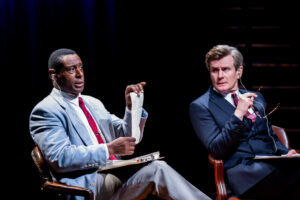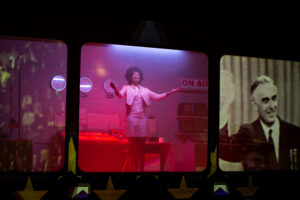The best new play I’ve seen this year
★★★★★

Best Of Enemies at the Young Vic is the best new play I’ve seen this year. James Graham’s writing is vivid, funny, and shocking. There are towring performances by the two leads David Harewood and Charles Edwards. And the production directed by Jeremy Herrin with a set by Bunny Christie is perfect.
Given the subject matter – the 1968 presidential election and in particular some televised debates between the influential conservative thinker William F Buckley and the liberal writer Gore Vidal – you might think Best Of Enemies is not for you, but you’d almost certainly be wrong. I know it sounds boring but believe me, in the hands of writer James Graham and director Jeremy Herrin, it becomes electrifying theatre.
Best Of Enemies may tell us a lot about the polarised society we live in today, but it does so in the form of a gripping entertainment that takes us inside the heads of two protagonists, narcissistic to the point of recklessness.
The play begins with the immediate aftermath of one of the later debates. There is anger and shock at language that has been used, although at that point we don’t know what’s been said or how it’s come to this. We then go back and see that the story began with ABC TV News, in a race for ratings, deciding to have well known intellectuals talking about the Presidential conventions, at which the Republican and Democratic candidates are elected.
This is about the corrupting influence of TV and there are three big screens high up at the back of the stage to remind what viewers are seeing, as well as showing us the studio control area. We see how the participants both take part because they see it as a way of promoting themselves. We then see over a series of debates how the confrontational format generates more heat than light.
We and they realise that how they come across is more important than what they say. Buckley’s wife Pat says: “That’s all this is. Who do I like the most?’ At the end, Vidal prophesies that this means that one day a candidate could get elected because he was more likeable rather than having the best policies. Don’t we know it?
Okay, that’s the bones of it but what James Graham has done is flesh that skeleton with bits of verbatim speech from the debates and lots of fictional dialogue that brings to life the two protagonists.
Electrifying performances by David Harewood and Charles Edwards
The two leads charge the production with electricity. David Harewood plays William F Buckley. You might be surprised that a Black actor is playing a right-winger whose whiteness was part of who he was, but a good actor inhabits the role. In this case, the role is of a man not comfortable in his own skin. Mr Harewood relishes the part, not only the external mannerisms, tics and lip licking and other nervous affectations, but also the inner person- the loneliness of the outsider, the devoted husband, the foundation of his beliefs, and the desperation to win. He does a remarkable job of making us feel sympathy for someone who could so easily be the villain, because of his racism and homophobia. When the first debates go badly for him under an onslaught from Vidal, I actually felt sorry for him. Then we see him planning to raise his game.
Charles Edwards conveys the smooth charm, razor wit, the insufferable superiority, obsession with power, and the vulnerability of Vidal. He was a patrician and his sense of superiority, while insufferable, helps him dominate those early debates. Then Buckley prepares better and starts to score points, and as Vidal squirms, so do we.
They are both intellectuals and they’re both narcissists. They want to win the debate so they can be more influential in the world of politics. Each of them is delighted when they’re recognised by leading politicians. They’re not portrayed as bad people, their extreme views seem to be more like an academic exercise than something from the heart, but they do have hearts and it’s their pride, and above all their desire to win that drives them from civilised conversation to conflict to playground name calling. Both seek out each other’s weaknesses, initially of their arguments but eventually personal ones, and you find yourself not wanting to look, as their feelings are exposed.
They live in ivory towers, not what most of the electorate would recognise as the real world. Obsessed by their personal dislike of each other, they don’t even anticipate the effect of their clashes on the world of politics, which is moving from compromise to polarisation. In the real world things fall apart.

We are shown something of what’s going on in that real world of 1968: Robert Kennedy and Martin Luther King are assassinated; an extreme feminist shoots Andy Warhol; there are protests about the Vietnam War. Looking back, we see that this was the beginning of the end of consensus politics and the start of polarisation: Left v right, young v old, plus conflicts of gender, race and sexuality. And on the other hand, there’s the so-called silent majority which Presidential candidate Richard Nixon appealed to. So tempers are rising, creating a sense of a pressure cooker.
The set itself is a small open stage surrounded on three sides by audience, turning the protagonists into gladiators in an arena.
All the other actors are first class. Among them, there’s Clare Foster as Buckley’s cheerful wife Patricia, Syrus Lowe as the angry but expressive James Baldwin and John Hodgkinson who plays the chair of the debates, revelling in the viewing figures but out of control of the wild horse he is riding. It’s only a cast of ten but they take on many characters, all well delineated, so you might think there were twice as many actors. It seems like every one of the characters has a contribution to make and every line has something to say.
Under the direction of Jeremy Herrin, this production zings along. As with the Wolf Hall trilogy or James Graham’s This House, which he also directed, he uses movement to add a physical excitement to the dialogue. I like the way he and James Graham make politics exciting. Because politicians shape our country and it’s a crying shame we find them boring or see them reduced to personalities.
Why were they the ‘best’ of enemies? They needed one another and they’re really quite similar.
Best Of Enemies is performing at the Young Vic until 22 January 2022. Performances will be streamed live on 20, 21, 22 January, 7.30pm, and 22 January 2.30pm GMT. Tickets from youngvic.org
Paul received a complimentary review ticket from the producers.